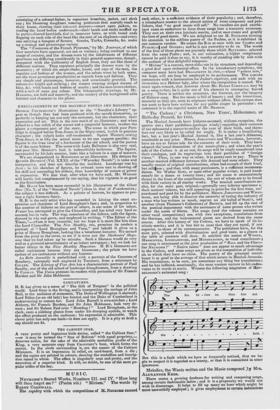" The Cadeau ;" a Christmas, New Years', Midsummer, or
Birth-day Present, for 1832.
The Musical Annuals have hitherto assumed, without exception, the quarto size; their publishers (perhaps wisely) regarding their contents of too ephemeral a nature to outlive the year of their birth, and there- fore not very likely to be called for singly. It is rather a humiliating
fact, but a last year's Musical Annual is, like a last year's Almanac, unsaleable at any price. Messrs. JOHANNING and Wnarsumn, however, have an eye to future sale for the contents of their work. They have adopted the' usual dimensions of the music-plate ; and when the year's sale of the Cadeau is at an end, its songs will be singly transferred into their catalogue, and its engravings into their portfolios of " foreign views." Thus, in one way or other, it is pretty sure to pay. There is another marked difference between this Annual and most others. They usually consist of original contributions, often bad enough of their kind, but stillinew ; and that, with many purchasers, is a sufficient recommen- dation. Sir Walter Scott, or some other popular writer, is paid hand- somely for a dozen or twenty lines ; and his name is ostentatiously thrust in the front of the contributors, the rest of whom are to be found with little variety in all similar works. The musical contributions are also, for the most part, original,—generally very inferior specimens of their authors' talents, but still appearing in print for the first time, anty_ purchased and paid for by the publishers. Messrs. JOHANNINO and Wasas- MORE, not being able to discover the necessity of taxing the industry of a man who has written so much, reprint an old ballad of Scott's, add another (from Thomson's Collection) of Burns's, and fill up the rest of the poetical department with the assistance of some person who writes under the name of Sforza. The songs (and the volume contains no other vocal compositions) are, with two exceptions, translations from the German, and the instrumental pieces are derived from the same source. After this history of the Cadeau, we have to speak of its in-
trinsic merits ; and it is but fair to state that they are equal, if not superior, to those of its contemporaries. The publishers have, for the most part, selected with discrimination and good taste, as a glance at
the table of contents will show. It exhibits the names of WEBER, MARSCHNER, LINDPAINTNER, and MENDELSSOHN, as vocal contributors ; one song is announced as the joint production of " BALL and the Cheva-
lier Nzuxonra !" "Native talent" does not appear to much advantage
in the Cadeau, and some songs are given as the composition of individu- als to which they have no claim. The poetry of the principal contri- butor is as good as the average of that which occurs in Musical Annuals. His translations, to be sure, are sometimes any thing but translations; and he has inflicted, occasionally, the most wanton torture in his endea- vours to fit words to music. Witness the following adaptation of Mass- DELSSOHN'S animated song :
But this is a fault which we have so frequently noticed, that we be- gin to suspect it is regarded as a beauty, or that it is committed in utter ignorance.


























 Previous page
Previous page